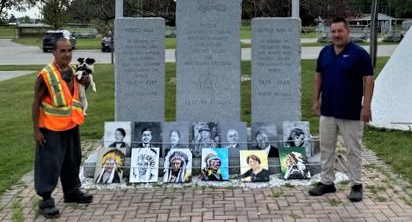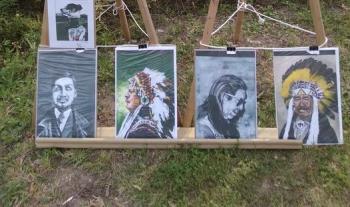Image Caption
Summary
Local Journalism Initiative Reporter
Windspeaker.com

Darren Cottrelle’s unique thank-you gift to his community will soon be on display for all to see at Aamjiwnaang First Nation in southwestern Ontario.
He recently gifted a newly-finished set of 13 painted portraits of the community’s chiefs dating back to the 1800s.
Cottrelle returned two-and-a-half years ago to Aamjiwnaang, just south of Sarnia, after many years away, some of them spent in a downward spiral of alcohol abuse and jail time.
The idea of painting the chiefs came to Cottrelle because he wanted to “give something back” to the people of Aamjiwnaang after he returned “with nothing but a few clothes,” living at a campsite with his dog. People first started giving him tents and food, and later arranged for an apartment for Darren, also known as Richard, and furnished it for him.
Donating the paintings was “the honourable thing to do,” Cottrelle tells Windspeaker.com.
During a brief presentation ceremony, current Aamjiwnaang Chief Christopher Plain thanked the artist for his donation and promised to place the portraits in a public place. In return for the donation, Plain presented the artist with a medicine bundle.
Cottrelle discovered his love for creating art as a child, but never had formal training. Pursuing a career as an artist while battling alcohol addiction, he found he was using money earned by selling his art to pay for drinking.
“I would sell my art real cheap. I had no marketing skills,” he recalls.
The artist says he’s spent probably half his life in correctional facilities. He first started doing portraits in jail and honed his skills there. After finally quitting alcohol about 10 years ago, he was able to do full-time work and started making better decisions about his life and art career, Cottrelle said.
“My business had more foundation then.”
“I wanted to show people you can get sober, you can put down the bottle, and you can quit drinking if you really want to. There’s a choice you have to make. You can choose to die or you can choose to live, so I chose to live, and I went into treatment.”
Art played a large part in Cottrelle’s recovery. While during his dark years his art expressed a lot of anger, Cotrelle now finds his art “generates a lot of positivity.”
The chiefs’ portraits span time from the early 1800s to the present. Cotrelle’s favourites among the paintings are the current chief and last chief, Joanne Rogers, the artist’s sister.
The series also includes Joshua Wawanosh, the hereditary chief who signed Treaty 29 in 1827 encompassing large parts of southwestern Ontario, and Fred Plain, who proposed to the federal government in 1969 that seats be set aside in the House of Commons for Canada’s First Nations, according to Aamjiwnaang historian David Plain in his book “The Plains of Aamjiwnaang.”
Cottrelle works mostly in acrylic paint on canvas, and has painted the chiefs’ portraits from photographs he finds on the internet or those brought to him by people who have heard about his project or have seen his works. He has created other art pieces honouring First Nations leaders, completing a series of Elders’ portraits for the Native Canadian Centre of Toronto.
In returning to Aamjiwnaang, Cottrelle hopes people can say ‘Here’s a man who’s come a long way.’ He suspects people might remember him as someone who “partied every day” and ended up losing his land at age 21.
His grandfather, who struggled after his early years were spent in residential school, had just died and young Darren, abusing alcohol, found, by his own recollection, he “wasn’t responsible enough” to take care of the land. He didn’t pay the bills and abandoned the property.
His next project is writing his life’s story, started years ago, which he hopes to publish both as a form of therapy for himself and also as a cautionary tale for others. When Cottrelle first started writing his autobiography, it helped him “step back” and ditch his addiction, he says.
Local Journalism Initiative Reporters are supported by a financial contribution made by the Government of Canada.

